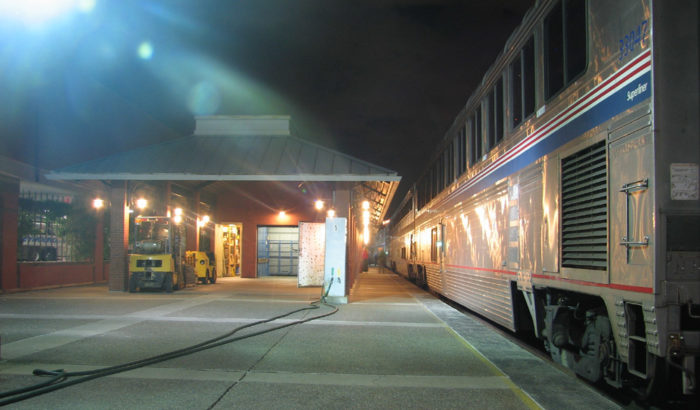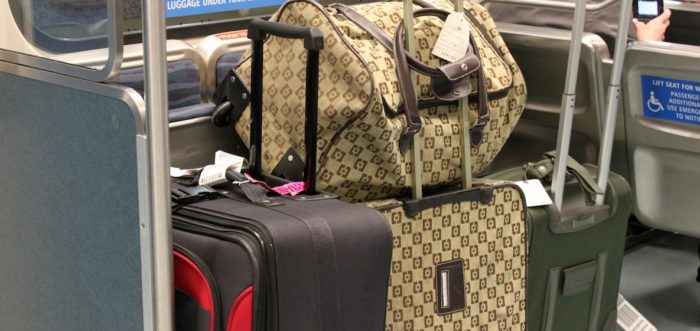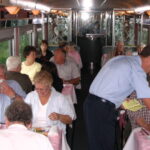More on the Missing Ticket Agents.
There are a number of frustrating aspects to Amtrak’s dogged determination to eliminate ticket agents in x-number of railway stations across the country. I’m told that the main argument in defense of this policy is that “everyone buys their tickets on line now” . . . hence no need for a ticket agent.
Sorry, I don’t buy that.

In fact, I’ll bet a hot fudge sundae that by far the biggest percentage of people who do use the internet to buy Amtrak tickets live in or near the Northeast Corridor—let’s say from Virginia to New Hampshire. But I seriously doubt that “everyone” who boards the Cardinal in Thurmond, West Virginia, or the Empire Builder in Staples, Minnesota, or in other communities in remote areas across the west and midwest, have uninterrupted high-speed internet connections. In fact, when those folks travel, I’ll bet a lot of them wander over to the railroad station and have the agent there print out their tickets.
After all, these are small stations in rural areas. Passengers have questions and Amtrak’s automated agent, Julie, doesn’t have all the answers. The ticket agent does, but not if he’s gone.
The fact is, ticket agents do more than just sell tickets. They handle checked luggage—receiving it, tagging it, and loading it on arriving trains. And, of course, they receive luggage and boxes that have been checked to their station. No ticket agent means no checked luggage, one more service gone that some passengers would consider important—maybe even essential.

The list of disappearing perks, especially those sleeping car passengers once enjoyed, keeps growing. Now, when a husband and wife in Staples, Minnesota, are waiting in sub-freezing temperatures at 1:30 in the morning to board the Empire Builder, there’ll be no one there to check their big bag or tell them the train had some mechanical issues after leaving St. Cloud and will be two hours late.
That’s OK. Just tell ’em Amtrak couldn’t afford the former ticket agent’s salary. I’m sure they’ll understand.




Hi Jim, as far as I’m concerned when travelling long-distance, checked baggage is a necessity. When you are going somewhere for a month you need it. How can one deal with all their baggage in Chicago when changing trains if you have to deal with everything you’ve got? There absolutely MUST be provision for long-distance travelers to check their baggage.
That’s certainly my feeling. Although I pack light and can be away for a month with everything packed in a rolling suitcase that fits in the overhead bin on the plane and a small tote that (barely) goes under the seat in front of me. The only caveat is building a day in the middle of my trip to get laundry done. But you’re right: for many people, especially families, the checked baggage option is essential.
Just as a further follow-up on this, checked baggage is an interesting subject. While some parts of the country have few trains offering the service (like north and east of NYP, only the overnighters to/from Boston and the Lake Shore). Meanwhile every single train on the Atlantic Coast Service (even the Carolinian and Piedmont!) does offer checked baggage. Meanwhile out west every last train on the Cascades route offers it (even those crossing the border). With one or two minor exceptions every train on the California Coastal routes timetable has a baggage car, and the same with the San Joaquins. Hopefully we can take this as encouragement. Living in VT, when I want to go west, I travel to and board at Albany/Rennselaer in order to get baggage checked (and to get decent parking)!
The US Postal Service, even though, like Amtrak, is largely controlled by labor unions and their supporters in Congress, has still managed to close some (but not nearly enough) brick and mortar post offices in very tiny hamlets, and in most cases “Village Post Offices,” third party retailers who have been happy to gain extra foot traffic, have been able to replace most services that were offered by a staffed USPS post office.
As mentioned by a couple of folks above, this is probably an idea that should be explored by Amtrak.
Oh, as a fan of long distance passenger train travel, ESPECIALLY the two-day two-night western routes, not only do I want them to continue, I want to see more enhancements such as premiere dining service and more sleepers to accommodate existing demand and grow revenue.
Yes, I know there’s no free lunch; of course I’d be willing to pay more for quality first-class service.
While I agree there is a loss, I honestly think that if Amtrak has limited funds, there are better things to spend money on than ticket agents. Pretty much everybody on any train I’ve been on recently bought their tickets online. That’s how we buy airline tickets, theatre tickets, and sports tickets, so it only makes sense train tickets should be primarily sold online as well.
I live in a rural area, and I can assure you there’s good internet access almost everywhere these days. In fact, an unstaffed station I use quite frequently (Princeton, Illinois) provides free wifi to waiting passengers. I can buy tickets and store tickets on my Android phone. I really can’t imagine why I would want a tagboard ticket these days. I can also get the current status on any train with my phone, and it’s at least as informative as anything I’ve gotten from an employee.
To me the biggest issue is reducing the opportunity for checked luggage. This is especially an issue because the luggage storage in many passenger cars is often full from the terminals, which means people boarding at smaller stations may have nowhere to put their bags. This could be solved by doing like VIA Rail does on some of their trains and having passengers at unstaffed stations place their bags directly into the baggage car.
This is a lost argument. As someone involved in transit advocacy – I feel many rail-focused advocates have completely missed the point. It is about ROI – ticket agents don’t have any; there is little evidence the mechanism for dispensing tickets or collecting fairs has a significant impact on ridership. Much more effective would be the argument of why someone is waiting in the sub-zero cold for a train? Trains are large, high capacity, and expensive. If that station is not a **place** the local advocate community has already failed. Much more effective would be working to activate stations so nobody is waiting in the cold dark on the platform. Is it not even worth having a food/coffee truck/cart show up around the time the train comes/goes? [worth while as in not having Amtrak pay for it, but worth while to someone themselves to do it] If the answer to that is “no”… it unavoidably begs a much larger question.
Ah, but when it comes to ROI, that’s where we disagree. Where’s the ROI on commuter rail or “The T” in Boston? Many of us “rail-focused advocates” believe that affordable public transportation is a right for all Americans. And for millions of Americans living all across the west and mid-west, their only affordable public transportation is Amtrak. How can we say, “Sorry, but the ROI just isn’t here” and shut down everything outside the NEC?
The essential train service isn’t gone, only the ticket clerk. And how much I love their work, how much is someone’s work worth if that work entails the selling of some 20 tickets? Tickets that could be sold through a third party too… As an experiment, could tickets be sold at post offices? At town hall? A local transit agency? I bet that most places served by a station have at least one (government) agency in the neighbourhood which could take the task to heart for a small fee, a win-win for both the agency in question for which it’s an extra source of income, and for Amtrak, the fee would still be lower than a full-time paid clerk. The service could even move to the station…
Yes, checked bags is still lost, but with a care-taker, passengers could still wait in a comfortable waiting room, a ticket machine can be placed in the building to print your own ticket, tv screens can give all needed information. I’ve seen tiny stations in the middle of nowhere in Scotland, France and Scandinavia, with hardly any trains, no ticket counters (you could buy your ticket in the train), but with an open waiting space with announcements, tv screens with the next trains in real-time, even with a small free library and pot plants. It’s not as good as a ticket clerk, but they can be missed… if the circumstances are right.
I’ve had any number of comments noting that it’s common in Europe for retail businesses to sell train tickets. Clearly, there needs to be some innovative thinking applied here and that certainly seems to be a feasible idea.
“””Clearly, there needs to be some innovative thinking applied”””
We are in complete agreement. If a station – if possible – can be turned into an active place, then selling tickets or offering assistance through a third party is a great alternative. A little bit of training and there is no reason a coffee vendor could not sell tickets via a tablet computer.
“””As an experiment, could tickets be sold at post offices? At town hall? A local transit agency?”””
THIS! There is more options than ticket agent or no ticket agent. My local once-a-day station has a little lobby with a vending type machine for purchasing and printing tickets; even that setup could be simplified to a tablet computer on the wall.
“””Where’s the ROI on commuter rail or “The T” in Boston?”””
The ROI is the job-density of Boston. The same thing can be said of NICTD’s South Shore – what is the ROI? It is Indiana collecting income tax on Chicago wages [and most South Shore stations are very rural and have no agents].
“””How can we say, “Sorry, but the ROI just isn’t here” and shut down everything outside the NEC?”””
There are many economically productive routes outside of the NEC. A strong argument can be made for almost all of the routes.
Aside: I will admit I would not have a problem with the loss of the super-long westerly routes out of Chicago: Empire Builder, Zephyr, and Chief. Every other route links city pairs at reasonable distances.
“””affordable public transportation is a right for all Americans”””
But the westward LDs do not provide a good transit service. I agree with your statement – but one has to qualify it at some point. Are we going to provide public transit to every single village? People **choose** location – location choice is always a cost-n-benefit analysis. Those choosing to live in a remote location are choosing that knowing the level of service will be much lower, or non-existent, relative to a more economically productive place.
Well, we’ll just have to agree to disagree on the LD trains.
Many people living in these areas are living there for decades, and it’s quite likely, those transit and other services were available for the inhabitants of rural communities. But for years, post offices have closed down, rural bus routes axed, shops have closed… until it’s no longer a choice to live there, but an obligation, with a property now worth close to nothing, and no bank willing to give a mortgage to an elderly couple to start anew somewhere else…
A rural resident can’t expect the same level of service as an urban dweller, but he should be able to count on the basics. He’s paying for them too, after all.
Yes, I agree. Well put.
> He’s paying for them too, after all.
That has changed as all those other services disappeared – likely that person has had the benefit of decades of tax cutting; they are no longer paying. I crunch the data on that kind of thing; take Michigan for example, ~73-79% of the states tax revenue is from the I94-I96 corridors. So ~15% of the states total areas pays the **lions share** of total revenue. This represents a serious economic shift we do not talk about nearly enough – the economy is concentrating and urbanizing, along with the citizens.
But on an individual level people are paying too. Only property taxes are generally lower in rural areas. Wages too, though.